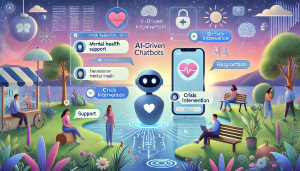 UseCasesFor.ai
UseCasesFor.ai
Choose Topic
 UseCasesFor.ai
UseCasesFor.ai
AI Use Cases
A collection of over 250 uses for artificial intelligence
A continually updated list exploring how different types of AI are used across various industries and AI disciplines,including generative AI use cases, banking AI use cases, AI use cases in healthcare, AI use cases in government, AI use cases in insurance, and more

Sign up
to receive a PDF containing all the use cases and stay updated with the latest AI trends and news (you can always unsubscribe)
Mental health support and crisis intervention chatbots

Introduction
Natural Language Processing (NLP) AI has advanced significantly over the past decade and is becoming crucial in various industries, including public services. In mental health and crisis intervention, NLP-driven chatbots provide immediate, personalized support, acting as empathetic virtual companions capable of understanding emotions and responding appropriately. This article explores challenges in the mental health sector, how NLP AI addresses these issues, and the benefits of implementing such technologies, including improved efficiency, better outcomes, and a strong return on investment (ROI). The use of NLP AI-driven chatbots in public services is on the rise, particularly in mental health support. These chatbots streamline service delivery by automating responses, reducing wait times, and offering tailored assistance to individuals in crisis. Real-life applications demonstrate their potential, from providing around-the-clock support to aiding healthcare systems in managing resource allocation efficiently. This paper discusses these advancements, highlights their transformative impact, and calculates ROI using real-world examples, emphasizing the growing role of AI in enhancing mental health services.
Challenges
There are many issues that affect the ability of public services to deliver mental health care and crisis care. Some of them are: shortage of resources, stigma related to mental health, physical barriers, and rise in the cases of mental health needs. Another important challenge is the expectation of fast response in crisis situations. Traditional approaches are often slow and may not be adequate for the type of support that is required in crisis situations which demand quick intervention. Some people also may not prefer to come forward and seek for help because of the stigma, or the perception of being judged or labeled. However, another challenge is that it is difficult to provide individualized care and ensure that a patient receives consistent follow-up given the large number of people who need mental health services.
AI Solutions
This is where NLP AI comes in as a solution to these challenges. Some of the applications of this include the use of AI driven chatbots which offer mental health support and crisis intervention services at all times. These chatbots apply NLP to process users’ inputs and output, recognize feelings of distress and offer the suitable response or intervention. It can also assist in reducing mental health stigma as it offers a way for people to share how they feel and be listened to without pressure. Some of the organizations that have adopted NLP AI include Crisis Text Line and Lifeline. For example, Crisis Text Line employs NLP to help in the identification of persons in need through the analysis of text messages. In addition, these AI solutions can also offer individualized care through learning from the previous conversations and make sure that the patient receives a follow-up, thus enhancing the quality of care.
Benefits
There are a large number of advantages of applying NLP AI in the field of mental health support and crisis intervention. It enables public services to make response time, thus minimizing the possibility of severe consequences. It also facilitates the delivery of tailored care thus enhancing the efficacy of the interventions. This paper also shows how NLP AI can also assist in the reduction of stigma related to mental health since it offers a way for people to share how they feel without being identified. In addition, it can ease the burden on the mental health workers, thus enabling them to attend to the most serious cases. It is also an economical way for public services as it can interact with many people at the same time.
Return on Investment
The ROI of NLP AI in the area of mental health support and crisis intervention can be seen as very high. Although, the initial investment in AI is rather costly, the costs in the future are more than offset. Some of the benefits of AI include; AI enabled chatbots are capable of managing many interactions at the same time hence cutting on the number of staff required, they are also able to respond to the client within the shortest time possible thus lowering the risk of harm and the costs that come with it. In addition, the enhanced efficiency of the interventions will help in enhancing mental health status thus decreasing the load of mental health problems in the society. According to a study done by Accenture, application of AI in health care can create annual cost savings of $150 billion by 2026 in the United States only.